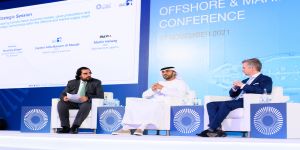Total annual GHG emissions from international shipping should be reduced by at least 50% by 2050 compared to 2008

The global maritime community convened at the ADIPEC 2021 Offshore and Marine Conference explored the critical enablers of decarbonising the industry and ensuring it is on track with the International Maritime Organization (IMO) targets and the UN Sustainable Development Goals.
ADIPEC 2021 Offshore and Marine Conference brings together industry leaders and decision makers from the global offshore and marine supply chain to meet in-person and identify the strategies and solutions for driving decarbonisation and digitalisation within the offshore and marine sector.
2021 marks a decade of action since the IMO adopted the first set of mandatory energy efficiency measures for ships, fundamentally changing the baseline for the performance of the incoming global fleet in terms of emission reduction.
The IMO’s 2018 Initial Strategy on the reduction of greenhouse gas (GHG) emissions from shipping set key ambitions to reduce CO2 emissions per transport work, as an average across international shipping, by at least 40% by 2030, and 70% by 2050, compared to 2008. Total annual GHG emissions from international shipping should be reduced by at least 50% by 2050 compared to 2008.
Captain Abdulkareem Al Masabi, CEO, ADNOC Logistics and Services said, “The global maritime industry is vital for sustaining international relations and trade, and the IMO has given us clear targets to achieve the decarbonising of our operations. Short-term solutions are having an interesting impact and providing us with significant results. As we move towards meeting the IMO’s requirements, these strategic insights will accelerate the industry's ambitious long-term goals."
“The transition to decarbonisation is a game-changer for the industry, but one that is complex and multi-faceted, requiring thought leadership and cross-ocean collaboration to meet the common objective of decarbonising the shipping industry,” added Masabi.
Other notable speakers included Martin Helweg, CEO, P&O Maritime Logistic; Yasser Nassr Zaghloul, Group CEO, National Marine Dredging Company (NMDC); and Guy Platten, Secretary General, International Chamber of Shipping (ICS).
With increased pressure on reducing greenhouse gas emissions, the conference also highlighted the debate around marine fuel choice, quality and operational challenges as critical to developing an industry chart for the future.
Christopher Hudson, President of dmg events, the organisers of ADIPEC said, “Shipping carries 80% of the world’s traded goods. The industry recognises that now is a critical time to identify and debate the merits of the best short-, mid-and long-term choice of shipping fuels and to assess whether the industry has the necessary infrastructure to allow these fuels to be the shipping fuels of the future.”
Subscribe to our newsletter & stay updated.